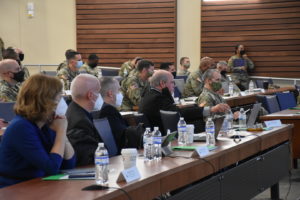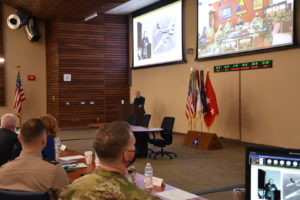

By Maj. Marion Jo Nederhoed
III Armored Corps Public Affairs
FORT HOOD, Texas – A panel of six expert researchers in the field of suicide prevention guided a conversation with III Armored Corps and Fort Hood leaders at a world-class suicide prevention training event on Jan. 20 here.
Leaders from across the III Armored Corps, reaching to subordinate units as far as Fort Bliss, Texas, Fort Carson, Colorado, attended this one day, distinctive seminar in person and virtually. The educational instruction and conversations focused on combating the determinants of suicide incidence rates through a critical examination of suicide – informed by evidence from the leaders in the field. Featured speakers included Dr. Thomas Joiner, academic psychologist; Dr. Craig Bryan, researcher; Dr. Mike Anestis, clinical psychologist; Dr. Emmy Betz, researcher and professor; Col. Sam Preston, chief Army Behavioral Health Division, Defense Health Agency, family physician and psychologist; and Dr. Eren Watkins, epidemiologist and public health practitioner.
“Today, we have put together a panel of experts that are going to help us take a look at ourselves and our society from a different perspective than what we have been doing,” said Lt. Gen. Pat White, commander, III Armored Corps and Fort Hood. “We need to generate more energy behind prevention. We have a lot of energy behind what happens after the fact. We have to stop this harmful behavior in our men and women who thinks this choice, not between life and death, but a viable choice in dealing with challenges in life that our soldiers are dealing with in their daily lives.”
White challenged leaders to take a hard look at what they are doing personally and professionally to take advantage of the seminar.
“Let’s make 2022 the year that we get after these harmful behaviors and specifically suicide,” he said.
Lt. Col. Chris Paine, Ph.D., behavioral health chief, Carl R. Darnall Army Medical Center here, initiated the idea for the training seminar.
Paine said the event provided the opportunity to critically examine what leaders think they know about suicide.
“Fundamentally, this seminar is an example of an evolutionary approach to reduce risk in the Army’s population at large, informed by the very best evidence,” he said. “We will do all we can to tackle the drivers that lead to suicide within the Army and to control the determinants of our Army’s incidence rate. This seminar is an example of how III Armored Corps is leading positive change for the Army at large. It is how we want to start the New Year. Seminars like this, with these subject matter experts and this audience, in particular, will help invoke population-based behaviors, interventions, and norms, to reduce unhealthy exposures and promote healthy ones.”
Maj. Gen. Michael R. Keating, deputy commanding general (support), said that III Armored Corps will continue to do everything they can, including seminars like this to bring in leading experts in the field of suicidality, to help understand how to better mitigate the devastating impact that suicide has on soldiers, families, communities and the Army.
“We will leave no stone unturned in our efforts to mitigate the frequency and consequence of suicide in our ranks,” Keating said. “Today, we are bringing the III Armored Corps team together with some of the world’s leading experts in suicidality to help us get better at mitigating the risks through a community-based approach to suicide prevention. I’m convinced that we all own part of the solution. Emotional intelligence is key — understanding ourselves and each other such that we can support one another in times of crisis and be a better team more broadly, whether that’s today, tomorrow or in the future.”
If you or someone you know is struggling, please don’t wait to reach out for help. Free assistance is available 24/7 at Military One Source or by phone at (800) 273-8255, Ext. 1.
